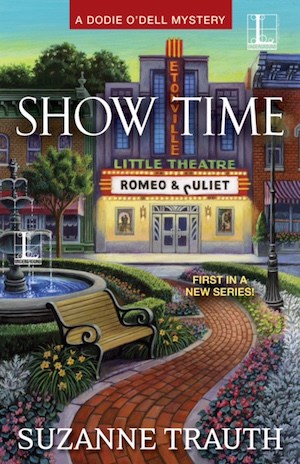We met Suzanne Trauth when she participated in our Pitchapalooza (think American Idol for books except kinder and gentler) at Watchung Booksellers. She pitched a piece of women’s fiction, which eventually morphed into a cozy mystery, and then she turned that mystery into a three-book deal with Kensington Books. Now that the first book, Show Time, is out, we thought we would pick her brain on writing, publishing, and getting a book deal.
Read the interview on the Huffington Post.

Suzanne Trauth (Photo: Steve Hockstein, Harvard Studio)
The Book Doctors: You’ve written plays, screenplays, nonfiction, and now a mystery series. In what ways do you differ in your approach to writing in these different genres, and in what ways are they the same?
Suzanne Trauth: I wrote in different genres at different points in my life. I wrote nonfiction works during my career as an academic theater professor. I also started writing screenplays during that period. But toward the end of my academic career, I segued into writing plays and novels. Though the writing varies widely, the basic approach is the same: sitting down in front of a blank screen and facing my fears that nothing will happen!
The nonfiction work required immense research and outlining; some of the plays required research, others less so. But all of them demanded character backstories and story arcs. Plays are developed in readings with actors, so as a playwright, I have had the opportunity to write and rewrite based on the discoveries that have come from the production process. With novels I share drafts with a “first reader” and an editor.
TBD: What made you decide to write a mystery series? What was the process like?
ST: I had worked on a serious novel for a number of years and decided I needed a break. So I chose to write a book that I thought was fun, a story about a group of women in a small town solving a mystery. But an editor indicated that I was writing between two genres and suggested I pick one! I chose the mystery angle on the novel and went from there. When I pitched the book to the publisher, I suggested it could be a series.
I have discovered that in writing a mystery novel—in addition to the elements present in all fiction—I had to thread clues and red herrings throughout the manuscript. After I finished a draft, I’d have to start at the beginning again and make sure I’d included enough evidence to keep my protagonist on the crime-solving path.

Kensington Books
TBD: How did you go about finding a publisher for your book?
ST: I was very fortunate to work with a wonderful editor for Show Time, my first book in the mystery series. He recommended I approach Kensington Books, the publisher, who subsequently took on the series. The first book Show Time came out in July 2016; Time Out is due in January 2017; and Running Out of Time will follow later in 2017.

Kensington Books
TBD: What were some of your favorite books as a kid? What are you reading now?
ST: I read constantly as a kid, mostly biographies and mystery stories: Nancy Drew, Trixie Belden, the Bobbsy Twins. I loved their adventures! Now I am in a book club with terrific readers and we sample a variety of books. Most recently we read Kate Atkinson’s Life After Life and A God in Ruins. We also read Elena Ferrante’s My Brilliant Friend and Cynthia D’Aprix Sweeney’s The Nest. These are such good friends that they even read my mystery Show Time for one meeting!
TBD: Theater is such a collaborative process, and in many ways writing books seems like such a solitary one. What are the joys and difficulties of both?
ST: Theater is an exciting, frustrating, exhilarating experience. I loved directing for many years but when I started writing plays, I discovered I preferred to be the author, the originator of the material, rather than the interpreter of the material. Which I feel is, to a degree, the job of the director. I love seeing my plays come to life onstage, to see my words come out of the mouths of talented actors.
At the same time, there is something so rewarding in sitting down alone at the computer and creating characters’ lives out of thin air. For me, when I write a novel, I am allowing the characters to breathe, to live through time. Plays are more an outline of a story. So much has to be communicated through subtext as well as text.
I enjoy the solitary time writing a novel, but at some point, I am usually ready to move into a rehearsal studio to take a break from creating alone. I am a mix of the hermit and the social butterfly! I flit from one genre to the other…
TBD: You’ve also taught writing. What have you learned from teaching people how to write? And in the end, do you think you actually can teach people to write?
ST: I taught screenwriting courses when I was still an academic in a theater program. I think teaching anything gives you the opportunity to learn a discipline all over again. In putting material out there for others, you are forced to deconstruct what you think you know. And, of course, there are always students who are bright and savvy and bring more to the table than I, as teacher, ever could! So I relearned how to construct a three-act arc, develop characters, move a story forward, and experiment with dialogue because I was requiring student writers to do the same.
Can you teach people to write? I feel there has to be a spark of creativity present. But I do think if you provide appropriate tools, a nurturing environment, specific feedback, and deadlines (!) you can lead someone down a path that will improve their writing and train them to pay attention to craft. That happened to me with great mentors and editors.
TBD: How do you tackle the challenges of writing a book that’s part of a bigger series? How do you ensure that these books stand alone, and yet are part of something bigger?
ST: It is a challenge! I guess the answer has been creating a balance between including pieces of book one in book two, and generating all new material. The characters, setting, and basic mystery elements are consistent from book to book, but enough explanation needs to be provided in later books to prevent confusion and provide clarity. For example, my editor—a wonderful guy—suggested I clarify how my protagonist ended up in the small town where she lives. In book one, it was a significant piece of information, and I needed to make sure if someone reads book two without reading book one, the story would be clear.
TBD: What was it like to interview all those people after Katrina? What did turning those interviews into a piece of theater teach you about writing and humanity?
ST: It was an amazing experience talking with New Orleans’ residents in 2007, two years after Hurricane Katrina. I have always maintained that the folks we interviewed found us; we didn’t find them. We went to New Orleans with a handful of names and they started to connect us to other people. Family and friends gave us names…the process snowballed. Pretty soon we had enough material for the play, which focused on the events leading up to the destruction in New Orleans and then the aftermath and the tremendous spirit of the people there. There is something special about New Orleans…not just the food and the music and the party atmosphere. There is a spirit of celebration and the feeling that home is a sacred place to the citizens of the city. My co-author and I learned that people have amazing resilience and generosity and heart…not just in dealing with Katrina but also in supporting our efforts to write the play. Needless to say, New Orleans is one of my favorite cities.
TBD: How did Pitchapalooza help you?
ST: When I did Pitchapalooza in Montclair, New Jersey, I had just begun the book that would become Show Time. But I needed to work on the genre. I kept characters and setting and revised the story elements. But the Pitchapalooza forced me to stand up and pitch the book! To face an audience of other writers and readers and sell my story. That experience prepared me for what was to come later. Recently, I was at a mystery writers convention and I had several occasions to pitch my book to potential readers—introducing the book, giving a two minute overview, etc. I learned a few things about engaging an audience in a short amount of time through my pitching session in Montclair.
TBD: We hate to ask you this, but what advice do you have for writers?
ST: Write what you love and don’t ever give up. Try to ignore the rejection and keep your eye on the prize! Persist, persist, persist…
Suzanne Trauth’s novels include Show Time (2016) and Time Out (2017), the initial books in a new mystery series published by Kensington Books. Her plays include Françoise, nominated for the Kilroy List; Midwives developed at Playwrights Theatre of New Jersey; Rehearsing Desire; iDream, supported by the National Science Foundation’s STEM initiative; and Katrina: the K Word. Suzanne wrote and directed the short film Jigsaw and is a member of the Mystery Writers of America, Sisters in Crime, and the Dramatists Guild. www.suzannetrauth.com
JOIN OUR NEWSLETTER TO RECEIVE MORE INTERVIEWS AND TIPS ON HOW TO GET PUBLISHED.




